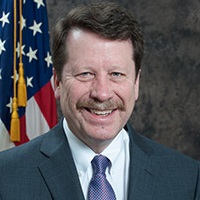
 By Robert M. Califf, M.D., MACC, Commissioner of Food and Drugs, and Vid Desai, Chief Information Officer, FDA
By Robert M. Califf, M.D., MACC, Commissioner of Food and Drugs, and Vid Desai, Chief Information Officer, FDA
Twitter: @US_FDA
Technology and data have disrupted our world in ways unimaginable only 20 years ago – including how the world thinks about health. The COVID-19 pandemic accelerated these changes and underscored the importance of aligning technology and data strategies to drive positive outcomes in our critical work addressing public health challenges. From how we integrate new technology into medical product application reviews and food safety efforts, to facilitating the use of data insights to help treat disease, technology and data are ubiquitous in the work of the U.S. Food and Drug Administration.
In 2021, we began an agency-wide data modernization and enhanced technologies initiative. The effort provides a framework for us to take a collaborative, centralized approach to modernizing our technical IT infrastructure and the way we manage data across the FDA.
As we mark the one-year anniversary of the agency’s Data Modernization Action Plan (DMAP), and nearly three years since launching the agency’s Technology Modernization Action Plan (TMAP), we are pleased to provide an update on our progress with “Modernization in Action.” The anniversary report provides a detailed review of our progress as we move closer to the speed of industry in streamlining workflows, reducing the cost of maintaining data and network security, and improving the timeliness of delivery of services. Some highlights from the report include:
Driving Technology Modernization
- Infrastructure and Operations Modernization. The agency’s abrupt and seamless shift to a teleworking mode amid an enormous surge of work during the pandemic to support 25,000 users demonstrated the stability of FDA’s IT environment. From hosting more than 429,000 virtual meetings annually, to managing more than 2,400 applications and databases, to managing a 457% increase in cyber-attacks compared to pre-pandemic levels, the FDA met these challenges as a result of modernization efforts combined with the hard work of the FDA workforce. People are at this core of this work and effective modernization requires investing in people and organizational culture to work sustainability. The Office of Digital Transformation (ODT) established a team focused on improving IT talent acquisition and strengthening an emerging IT and data workforce. These activities have led to a 9.6% hiring increase over the prior year and a 17% improvement in Federal Employee Viewpoint scores.
- Agile and Product Culture. In addition to providing us the ability to pivot because of the pandemic, TMAP has proven an important framework for our general infrastructure work. Through it, we are positioned to implement Presidential EO 14028, Improving the Nation’s Cybersecurity, issued May 2021, directing agencies to modernize their cybersecurity capabilities. We continue to meet significant milestones in our move to the cloud, concurrent with End-of-Life (EOL) modernization initiatives resulting in >15% reduction of EOL devices in CY2021. This work is coupled with the adoption of industry standards and good practices like Development, Security, and Operations (DevSecOps) and Information Technology Infrastructure Library (ITIL) processes across all operating areas. Ultimately, increased automation, sharing, reuse and consistent, repeatable processes are significantly improving the agility and cost effectiveness of IT activities. This work is supported by a strengthened strategic planning and budget process, analytics, and enhanced governance – working together to prioritize objectives and investments.
- Collaborations among the FDA, other government agencies, and stakeholders – including the data/technology sector – has been the catalyst for more effective development of scalable, technical tools needed for the future. The Guest Collaboration Experience allows the FDA staff to communicate and collaborate with external entities. In partnership with the Reagan-Udall Foundation, the FDA and the Friends of Cancer Research launched the Evidence Accelerator (EA) to advance the use of Real-World Data (RWD) to inform the COVID-19 response. In collaboration, ODT and the FDA’s Office of Food Policy and Response hosted the FDA New Era of Smarter Food Safety Low- or No-Cost Tech-Enabled Traceability Challenge.
Driving Data Modernization
- Driver projects are initiatives with measurable value that help multiple stakeholders envision what is possible, allow technical and data experts to identify solutions, and develop foundational capabilities in the agency. This strategy was an intentional departure from collecting data first and, subsequently, defining the questions the data can answer.
- Data practices help simplify data acquisition and reduce cycle time, strengthen governance, and provide security and scalability for enterprise use of data. Our progress over the past year ensures the FDA has access to high-quality, well governed data for use in public health decision making.
- The DMAP includes a strong focus on talent and elastic talent networks to drive innovation, efficiencies, and collaboration. We will continue to build on initiatives including scalable training, an AI-supported FDA-Expertise and Research Portal, and government-wide approaches to recruit and retain data scientists.
Looking Ahead
Our journey forward includes the upcoming Enterprise Data Implementation Roadmap and the FDA AI strategy, which will enhance our ability to put our data to work. It’s imperative we create enterprise-wide processes to support the people of the FDA and their work. This year we will roll out our Enterprise Modernization Action Plan – our plans to shape the FDA’s future by delivering successful cross-agency efforts that optimize shared business processes, enhance operational efficiency and use of our data, while strengthening the alignment between agency-wide strategic objectives and investments.
When the FDA applies more advanced technologies to its work, the agency can help facilitate innovative development of FDA-regulated products and new methods of generating and analyzing data to evaluate whether those products meet the FDA’s standards that patients depend upon. Ultimately, successful modernization of data and technology should make the job of working at the FDA both more productive and more fun. We know that people who work at the FDA love to make a difference, use the best science based on evidence and apply their talent to analysis of options to make good decisions. We intend for data and technology modernization to support a better and more satisfying way of working at the FDA.
This article was originally published on FDA Voices and is reprinted here with permission.
